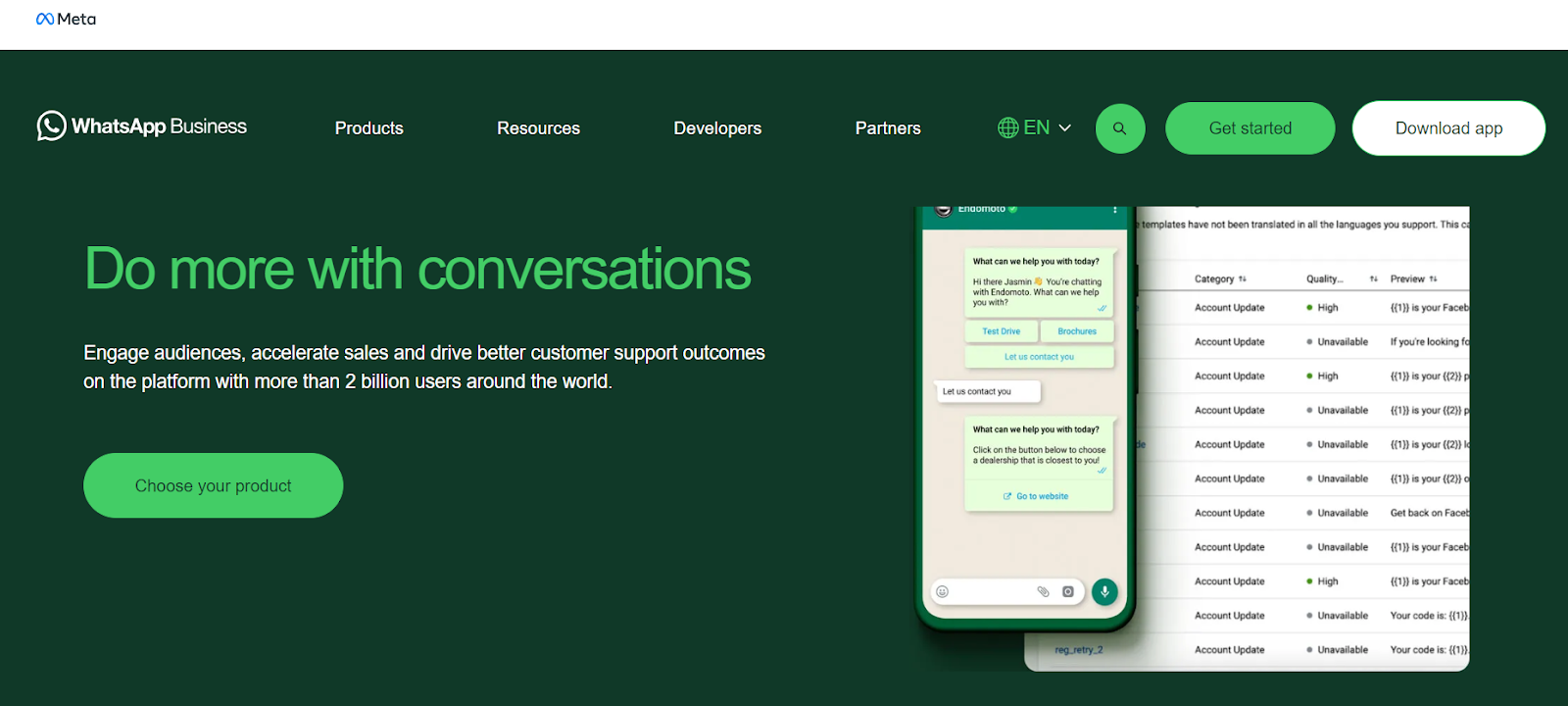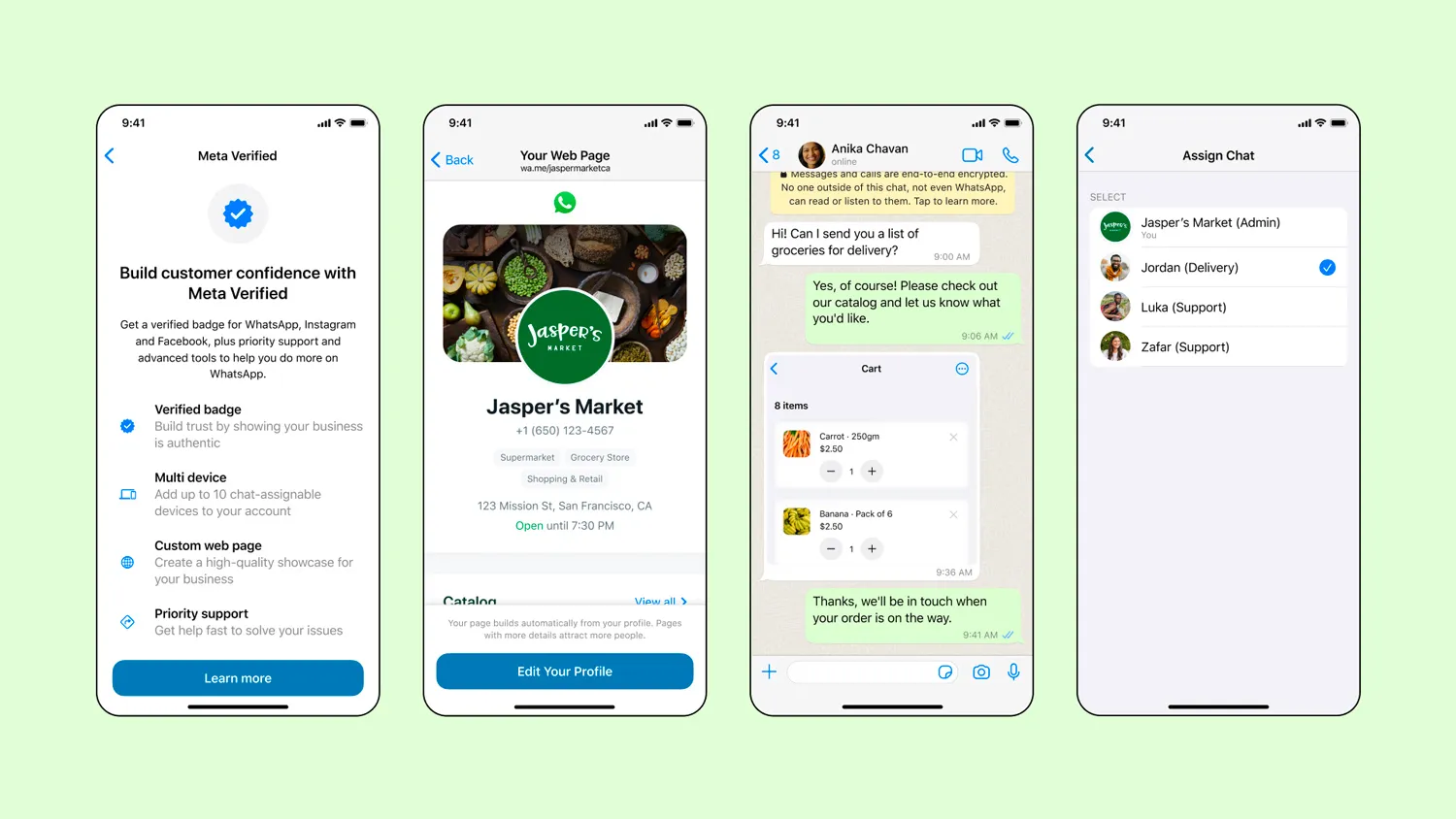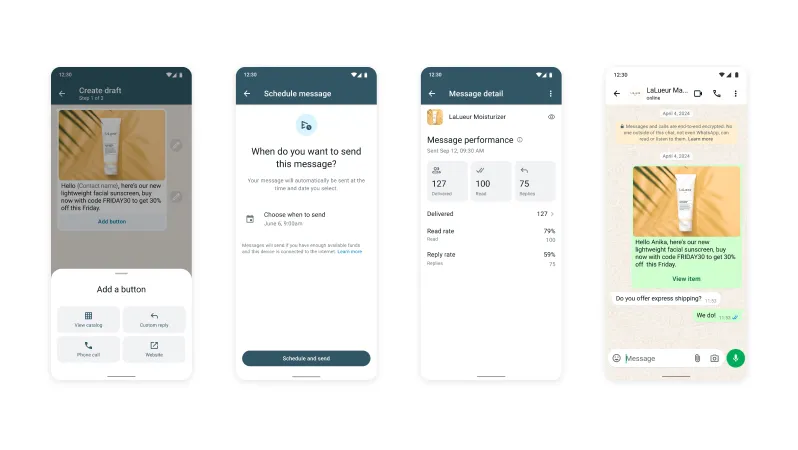Are you looking to connect with customers on a budget?
WhatsApp can help you do just that!
With 68% of WhatsApp users checking the app daily, it’s a powerful way for small businesses to engage with their audience right where they are. It’s no secret that WhatsApp has a huge reach, with over 100 billion messages exchanged daily. This makes it a great tool for staying connected with your audience in a way that feels personal and immediate. Small businesses can use WhatsApp to drive engagement, customer retention and sales by creating direct, one-on-one relationships with customers.
Let’s explore cost-effective WhatsApp marketing strategies that can create big results. Whether you want to learn how to use WhatsApp for marketing or need a new strategy to stand out, these tactics offer a direct and personal way to connect with customers, drive sales, and build loyalty, without draining your marketing budget.
Why WhatsApp Marketing is Ideal for Small Businesses?
WhatsApp marketing is not only cost-effective but also highly effective. The platform boasts a 98% open rate on messages, compared to 20% for email, making it ideal for direct and instant communication. Small businesses benefit by reaching customers where they spend time, creating opportunities for engagement and relationship building.
For small businesses with limited budgets, WhatsApp marketing can replace traditional advertising costs. The platform supports multimedia, allowing businesses to share images, videos, and even documents. This personal touch makes WhatsApp unique, as customers feel more engaged when they receive tailored content.
Benefits of WhatsApp Marketing for Small Businesses
- High Engagement Rates: WhatsApp messages are read within minutes, making customer responses quick.
- Cost-Effective: Free to use, with low-cost features like broadcast messages and status updates.
- Personalized Interactions: Enables one-to-one or group communication tailored to customer needs.
WhatsApp also makes customer service more accessible. Businesses can answer questions, resolve complaints, and update customers in real-time. This immediate access builds trust and customer loyalty.
Setting Up Your WhatsApp Business Profile for Success

To get started, you’ll need a WhatsApp Business account. This version of the app provides business-specific features such as business profiles, quick replies, and automated messages. Follow these steps to optimize your profile:
- Download and Set Up: Install the WhatsApp Business app and register your business phone number.
- Business Details: Add key details, including business name, location, and category. Use a professional logo for branding.
- Product Catalog: Upload a product catalog to make it easy for customers to browse your offerings directly within WhatsApp.
- Set Up Quick Replies: Create replies for common questions. This will save time and provide prompt customer service.
- Automate Greetings and Away Messages: Keep customers informed even when you’re unavailable. You can set automated messages for times outside of business hours.
These simple setup steps help small businesses appear professional and accessible. A complete profile builds credibility, and customers are more likely to engage with a business that appears trustworthy.
Low-cost and high-impact WhatsApp marketing tactics for small businesses

1. Implement WhatsApp Links and QR Codes
- Generate custom links or QR codes that direct customers to a WhatsApp chat. Place these on websites, social media profiles, business cards, or in-store displays.
- These make it easy for customers to connect with you instantly, whether they want to inquire about products, place orders, or join a special promotion group. This tactic increases accessibility and convenience, encouraging direct engagement.
- Use Case: A coffee shop can add a QR code on tables that leads customers to a WhatsApp group for daily specials.
2. Send Rich Media Content (Photos, Videos, and Voice Messages)
- Use WhatsApp’s multimedia capabilities to send product images, demonstration videos, or voice notes to make the customer experience more interactive.
- Visual and audio content captures attention better than text alone, increasing the likelihood of engagement. Multimedia content is also more memorable, enhancing the customer’s experience with your brand.
- Use Case: A pet store can send customers videos of pets enjoying their products, like a video of a dog playing with a new toy. Voice messages can add a personal touch to thank customers for purchases or wish them on special occasions.
3. Use WhatsApp Broadcasts for Exclusive Announcements
- Broadcasts allow you to send messages to multiple people at once without creating a group. This feature is ideal for promoting flash sales, product launches, or special announcements.
- Since recipients receive the message as a one-on-one chat, they feel it’s more personal. This method is more engaging and effective than sending out a generic email.
- Use Case: A local bookstore can use broadcasts to announce new book arrivals or special discounts for VIP customers. With broadcast lists segmented by genre preference, they can send tailored recommendations, making customers feel valued.
4. Use Status Updates for Daily Engagement
- WhatsApp Status allows businesses to share updates that last 24 hours. It’s a low-cost way to keep customers updated on promotions, new products, and seasonal offers.
- Status updates feel like casual content rather than traditional ads, which can make customers more receptive. Plus, it creates urgency since they disappear after a day.
- Use Case: A fitness club can post daily workout tips, success stories, or limited-time discounts on classes, encouraging viewers to inquire about services before the offers expire.
5. Create Customer Communities Through WhatsApp Groups
- Use WhatsApp groups to build a loyal community around your brand. Groups can be created for customers who are interested in certain topics, products, or exclusive content.
- Groups foster direct communication between your business and customers. They encourage interaction, building a sense of community that boosts brand loyalty and engagement.
- Use Case: A small gardening supply store can create a group for local plant enthusiasts, sharing gardening tips, product suggestions, and exclusive promotions. Customers can ask questions, exchange advice, and feel connected to the business.

6. Set Up Automated Messages for Quick Responses
- Automated messages can be set up to handle common customer queries, send greetings, or confirm orders. They’re particularly useful for answering frequently asked questions or providing updates during off-hours.
- Automation ensures customers receive immediate responses, which increases satisfaction. It’s also a time-saver for small businesses that may not have dedicated customer service teams.
- Use Case: A bakery can use automation to confirm order details, share pickup or delivery instructions, or let customers know business hours, ensuring quick answers to commonly asked questions.
7. Launch Limited-Time Offers and Flash Sales
- Use WhatsApp to promote flash sales or limited-time offers, encouraging quick purchases through direct and time-sensitive messages.
- Flash sales create urgency, prompting customers to act quickly. With WhatsApp’s high open rates, your audience is more likely to see and act on these time-sensitive offers than through other channels.
- Use Case: An online clothing boutique can announce a 24-hour discount on specific items, urging customers to act quickly. This sense of urgency can drive impulse purchases and boost sales.
8. Use Polls and Surveys to Collect Customer Feedback
- Send out quick polls or surveys on WhatsApp to gather feedback from your customers. This can be done via simple questions or multiple-choice responses.
- Gathering feedback not only shows that you care about customer opinions, but it also provides valuable insights to improve your products or services.
- Use Case: A restaurant can ask customers about their recent dining experience or request menu suggestions. Offering a small incentive, like a discount on the next visit, encourages participation.
9. Share Personalized Product Recommendations
- Use customer data, such as previous purchases or browsing habits, to send tailored product recommendations via WhatsApp.
- Personalized recommendations increase the likelihood of repeat purchases, as customers are more inclined to buy when the product aligns with their interests.
- Use Case: A skincare brand can send a follow-up message to a customer who purchased a moisturizer, suggesting complementary products like a facial cleanser or sunscreen, enhancing their overall experience.
10. Use WhatsApp to Collect User-Generated Content
- Encourage customers to share photos or videos of themselves using your products. These can be posted in WhatsApp groups or featured in status updates.
- User-generated content acts as social proof, showing other potential customers that people enjoy your products. It’s a low-cost way to build trust and attract new customers.
- Use Case: A bakery can invite customers to share photos of their custom cakes, building a visual showcase of satisfied customers. Featuring these images in status updates also gives customers a sense of being recognized and valued.
Wrapping Up
WhatsApp marketing offers small businesses a direct, cost-effective way to build meaningful relationships with their customers. By using WhatsApp’s tools creatively, such as through personalized messages, interactive challenges, and status updates, businesses can engage customers on a platform they are already comfortable with. WhatsApp marketing allows for real-time interactions, ensuring customers feel valued and connected to the brand.